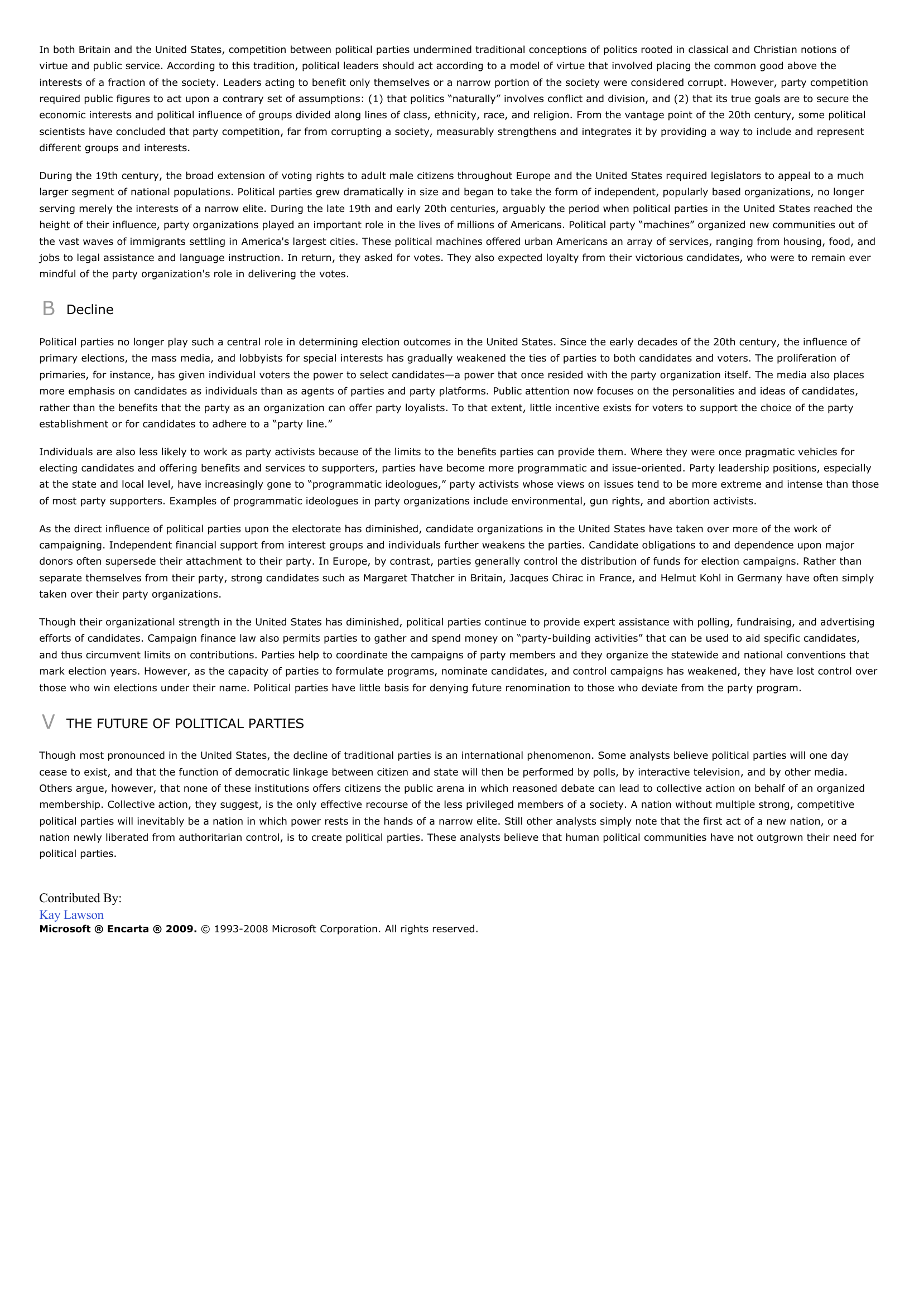Political Parties.
Publié le 10/05/2013

Extrait du document
«
In both Britain and the United States, competition between political parties undermined traditional conceptions of politics rooted in classical and Christian notions ofvirtue and public service.
According to this tradition, political leaders should act according to a model of virtue that involved placing the common good above theinterests of a fraction of the society.
Leaders acting to benefit only themselves or a narrow portion of the society were considered corrupt.
However, party competitionrequired public figures to act upon a contrary set of assumptions: (1) that politics “naturally” involves conflict and division, and (2) that its true goals are to secure theeconomic interests and political influence of groups divided along lines of class, ethnicity, race, and religion.
From the vantage point of the 20th century, some politicalscientists have concluded that party competition, far from corrupting a society, measurably strengthens and integrates it by providing a way to include and representdifferent groups and interests.
During the 19th century, the broad extension of voting rights to adult male citizens throughout Europe and the United States required legislators to appeal to a muchlarger segment of national populations.
Political parties grew dramatically in size and began to take the form of independent, popularly based organizations, no longerserving merely the interests of a narrow elite.
During the late 19th and early 20th centuries, arguably the period when political parties in the United States reached theheight of their influence, party organizations played an important role in the lives of millions of Americans.
Political party “machines” organized new communities out ofthe vast waves of immigrants settling in America's largest cities.
These political machines offered urban Americans an array of services, ranging from housing, food, andjobs to legal assistance and language instruction.
In return, they asked for votes.
They also expected loyalty from their victorious candidates, who were to remain evermindful of the party organization's role in delivering the votes.
B Decline
Political parties no longer play such a central role in determining election outcomes in the United States.
Since the early decades of the 20th century, the influence ofprimary elections, the mass media, and lobbyists for special interests has gradually weakened the ties of parties to both candidates and voters.
The proliferation ofprimaries, for instance, has given individual voters the power to select candidates—a power that once resided with the party organization itself.
The media also placesmore emphasis on candidates as individuals than as agents of parties and party platforms.
Public attention now focuses on the personalities and ideas of candidates,rather than the benefits that the party as an organization can offer party loyalists.
To that extent, little incentive exists for voters to support the choice of the partyestablishment or for candidates to adhere to a “party line.”
Individuals are also less likely to work as party activists because of the limits to the benefits parties can provide them.
Where they were once pragmatic vehicles forelecting candidates and offering benefits and services to supporters, parties have become more programmatic and issue-oriented.
Party leadership positions, especiallyat the state and local level, have increasingly gone to “programmatic ideologues,” party activists whose views on issues tend to be more extreme and intense than thoseof most party supporters.
Examples of programmatic ideologues in party organizations include environmental, gun rights, and abortion activists.
As the direct influence of political parties upon the electorate has diminished, candidate organizations in the United States have taken over more of the work ofcampaigning.
Independent financial support from interest groups and individuals further weakens the parties.
Candidate obligations to and dependence upon majordonors often supersede their attachment to their party.
In Europe, by contrast, parties generally control the distribution of funds for election campaigns.
Rather thanseparate themselves from their party, strong candidates such as Margaret Thatcher in Britain, Jacques Chirac in France, and Helmut Kohl in Germany have often simplytaken over their party organizations.
Though their organizational strength in the United States has diminished, political parties continue to provide expert assistance with polling, fundraising, and advertisingefforts of candidates.
Campaign finance law also permits parties to gather and spend money on “party-building activities” that can be used to aid specific candidates,and thus circumvent limits on contributions.
Parties help to coordinate the campaigns of party members and they organize the statewide and national conventions thatmark election years.
However, as the capacity of parties to formulate programs, nominate candidates, and control campaigns has weakened, they have lost control overthose who win elections under their name.
Political parties have little basis for denying future renomination to those who deviate from the party program.
V THE FUTURE OF POLITICAL PARTIES
Though most pronounced in the United States, the decline of traditional parties is an international phenomenon.
Some analysts believe political parties will one daycease to exist, and that the function of democratic linkage between citizen and state will then be performed by polls, by interactive television, and by other media.Others argue, however, that none of these institutions offers citizens the public arena in which reasoned debate can lead to collective action on behalf of an organizedmembership.
Collective action, they suggest, is the only effective recourse of the less privileged members of a society.
A nation without multiple strong, competitivepolitical parties will inevitably be a nation in which power rests in the hands of a narrow elite.
Still other analysts simply note that the first act of a new nation, or anation newly liberated from authoritarian control, is to create political parties.
These analysts believe that human political communities have not outgrown their need forpolitical parties.
Contributed By:Kay LawsonMicrosoft ® Encarta ® 2009. © 1993-2008 Microsoft Corporation.
All rights reserved..
»
↓↓↓ APERÇU DU DOCUMENT ↓↓↓
Liens utiles
- Political Parties in the United States.
- Civilisation britannique: Elections and Political Parties
- ORGANISER LES PARAGRAPHES D'UN TEXTE Remets dans l'ordre en les numérotant les différentes parties de ces deux textes.
- TRAITÉ SUR LES PARTIES DES ANIMAUX
- LES PARTIES DU CHATEAU-FORT1.


